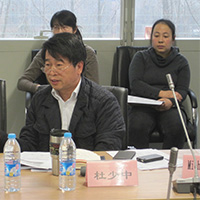
First workshop convened high-ranking Chinese environmental officials and experts from top government, university and research offices.

The MIT-Tsinghua China Energy and Climate Project held a workshop on Tuesday March 12 to kick off a landmark study on the impact of China’s vehicle emissions and fuel standards on energy, economic, emissions, air quality and health. The study is being supported by a grant from the Energy Foundation, which provides resources to institutions that most effectively leverage change in transitioning to a sustainable energy future. The workshop, held at Tsinghua University, was hosted by collaborators at the university’s Institute for Energy, Environment, and Economy.
“Understanding the role fuel quality standards could play in cutting China’s emissions and air pollution is crucial to the health of the communities, as well as to addressing growing urban sustainability challenges,” says Valerie Karplus, director of the MIT-Tsinghua China Project and a co-researcher for the study. “This study will provide that insight. We’re grateful to have the support of the Energy Foundation, as well as feedback from a varied stakeholder base.”
The researchers will perform a comparison of policy options for reducing transportation emissions in China. This process will begin with an analysis of China’s transport sector and an updated inventory of emissions by sector. Researchers will also identify regional air quality impacts using a regional chemical transport model and analyze the impact of various policy options on energy use, emissions, the economy and human health.
“This study will be the first to use of an integrated model – simulating travel demand, fuel use, vehicles emissions and air quality – to determine health and economic impacts of fuel policies in China,” Eri Saikawa, a professor at Emory University and the lead researcher for the study, said. “The model will be a powerful tool for assessing transport policy options currently under discussion in China.”
Throughout the project, researchers will communicate their results to policymakers through an ongoing and interactive process. The March 12th workshop was the first of several of these meetings. It brought together stakeholders from China’s Ministry of Environmental Protection and the Beijing Environmental Protection Bureau, as well as experts from Tsinghua University, Beijing University, Nanjing University, Clean Air Initiative-Asia, the International Council on Clean Transportation, the Energy Foundation, and the Health Effects Institute.
At the March 12th meeting, the stakeholders provided input on which policy questions would be of greatest interest for the study to consider and explored how the results of the study might be used within their organizations. It was decided that the research would focus on assessing the impacts of fuel quality standards and tailpipe emissions standards in China, with a focus on the potential benefits of implementing the China 6 standard, which is the toughest standard announced so far and targets deeper reductions in nitrous oxide emissions country-wide before 2020.

